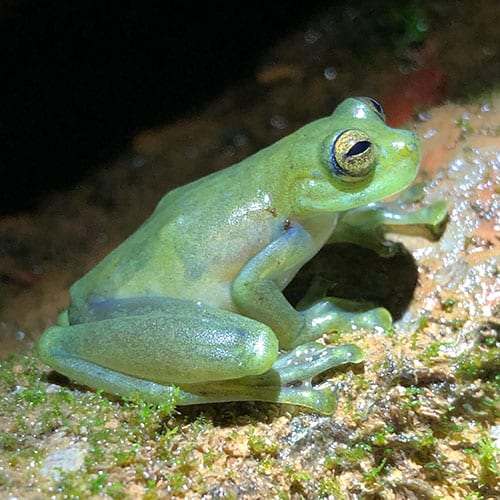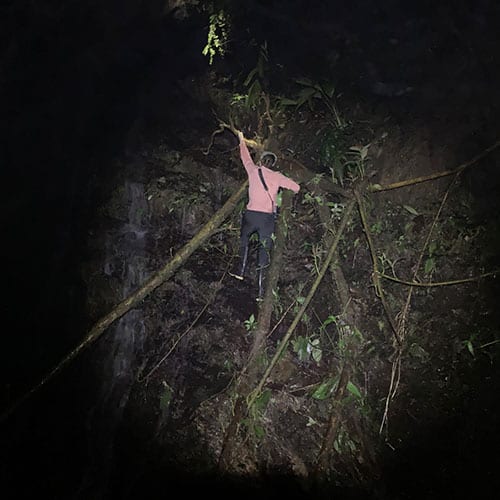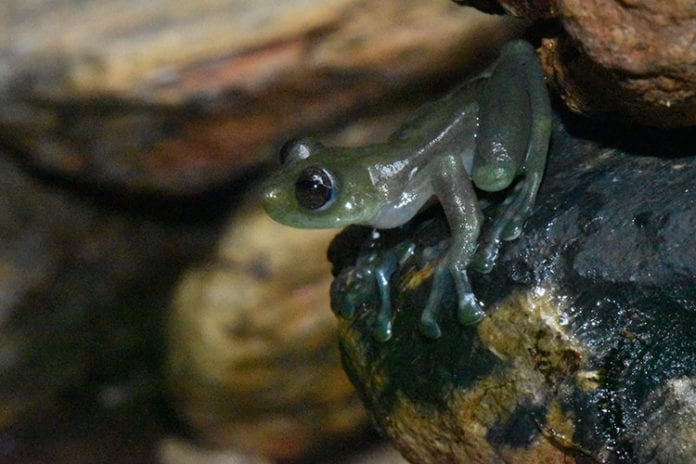A species of Ecuadorian glass frog adapts itself to the noisy environment by using high-frequency croaking and visual signalling – hand waving, foot waving and head bobbing – to attract mates. Usually, frogs use their croaks to attract mates, but in certain noisy environments such as near waterfalls, this isn’t enough. Hence, some species have evolved to use a new technique: long-distance visual displays.
The first known instance of this two-fold strategy to attract mates in the glass frog family has been reported, in a new research. The research specifically mentions Sachatamia orejuela, a species native to Ecuador and Columbia. The behaviour has also been observed in frogs living in other regions like India, Brazil and Borneo.
Rebecca Brunner is a PhD student at UC Berkeley and the first author of the new paper. She explained, “A handful of other frog species around the world use visual signalling, in addition to high-pitched calls, to communicate in really loud environments. What’s interesting is that these species are not closely related to each other, which means that these behaviors likely evolved independently, but in response to similar environments — a concept called convergent evolution.”

Using visual signalling to attract mates
Sachatamia orejuela glass frogs are native to the rainforests of Colombia and Ecuador. They are almost exclusively found on rocks and boulders near waterfalls. The rushing water and slippery surface offer some protection against predators. Their green-grey colour and semi-transparent skin help them camouflage and make them impossible to spot. Hence, very little information is available about how the glass frog attracts mates.
Brunner studies the bioacoustics of different ecological environments. When she was deep inside an Ecuadorean rainforest, stream recording the call of a Sachatamia orejuela, she observed for the first time the visual signalling behaviour used to attract mates. She climbed up a slippery rock face to record this sight, balancing herself on one foot.
She recounts, “I was already over the moon because I had finally found a calling male after months of searching. Before our publication, there was no official record of this species’ call, and basic information like that is really important for conservation. But then I saw it start doing these little waves, and I knew that I was observing something even more special.”
While she was filming, the frog waved its hands and feet and bobbed his head. She also noticed another male Sachatamia orejuela glass frog performing the same actions.
“This is a really exhilarating discovery because it’s a perfect example of how an environment’s soundscape can influence the species that live there. We’ve found that Sachatamia orejuela has an extremely high-pitched call, which helps it communicate above the lower-pitched white noise of waterfalls. And then to discover that it also waves its hands and feet to increase its chances of being noticed — that’s a behaviour. I’ve always loved reading about it in textbooks, so it is beyond thrilling to be able to share another amazing example with the world,” said Brunner.
The pandemic has halted Brunner’s fieldwork but she hopes to return to Ecuador soon and continue her research.

“One of the best things about fieldwork is that nature is always full of surprises — you never know what discoveries you may happen upon,” Brunner said. “I hope our findings can serve as a reminder that we share this planet with incredible biodiversity. Conserving ecosystems that support species like Sachatamia orejuela is important not only for our well-being but also for our sense of wonder.”
Further Reading:


